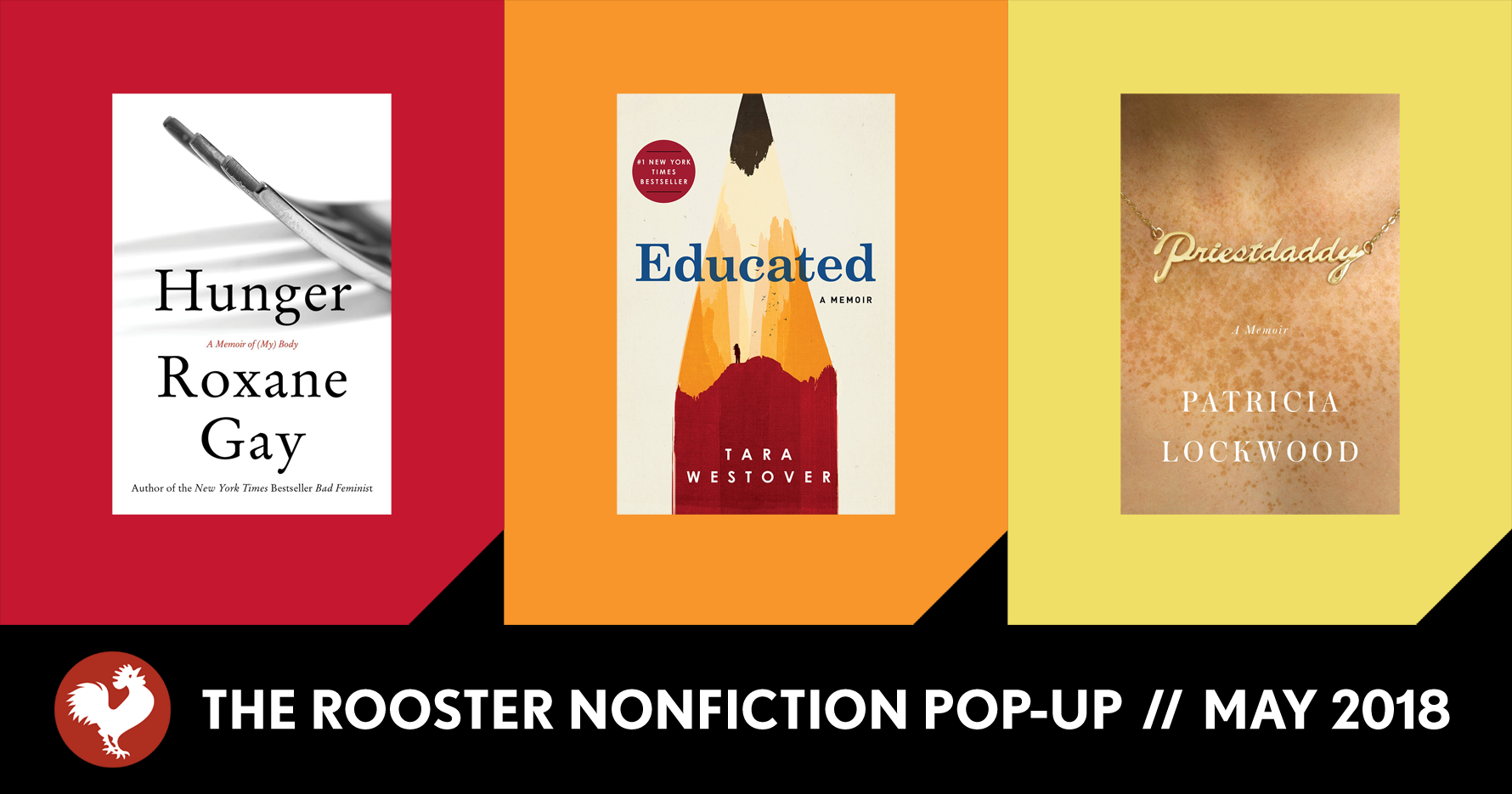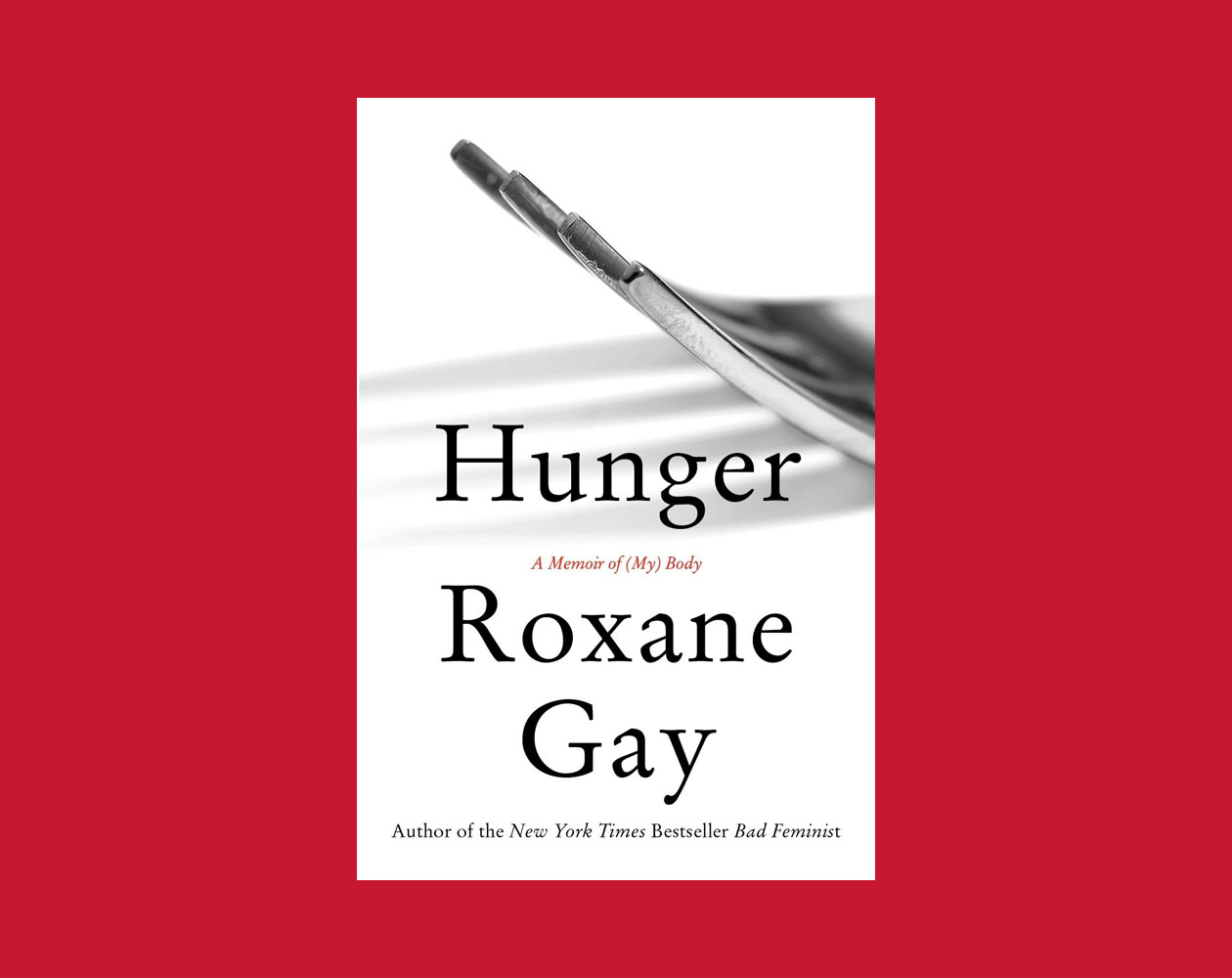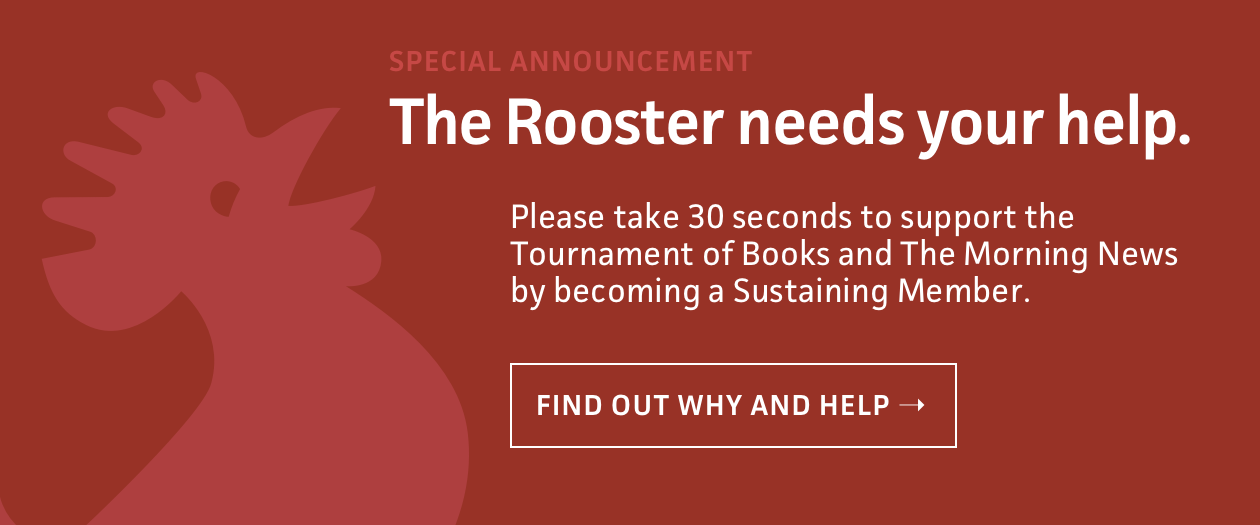Welcome to the Rooster Nonfiction Pop-up, brought to you by the organizers of the Tournament of Books.
All month long we’ll be discussing three recent works of nonfiction. To choose which books we’re reading this month, we asked this year’s ToB readers for suggestions back in March. We narrowed that list down to a single genre—memoir—and our readers voted to decide which three books we’d read for this event, and here they are: Hunger by Roxane Gay, Educated by Tara Westover, and Priestdaddy by Patricia Lockwood. You can see the full list of nonfiction contenders here.
Unlike the Tournament of Books and the Rooster Summer Reading Challenge, the Rooster Nonfiction Pop-up isn’t a competition—only a discussion about these three memoirs. Every Tuesday and Friday in May we’ll meet up to talk, and we’ll be teaming up with Sarah Hepola, author of the New York Times bestselling memoir Blackout: Remembering the Things I Drank to Forget. Grab some books and join in the fun!
- See the May 2018 nonfiction reading schedule
- Jump into today’s discussion in the comments
Please note: We receive a cut from purchases made through the book links in this article.
Rosecrans Baldwin: Welcome, everyone, to our first Rooster nonfiction event. We’ve been talking about doing this for years, and now it’s finally happening.
Today we’re discussing the first half of Hunger by Roxane Gay, through chapter 42. Hunger, published in 2017, is Gay’s fourth book, after Ayiti (2011), An Untamed State (2014), and Bad Feminist (2014). She also co-wrote the World of Wakanda comic (2016). Since Hunger, she’s published Difficult Women (2017) and edited Not That Bad: Dispatches From Rape Culture, which was published earlier this week.
Hunger received, by far, the most votes in our Tournament of Books reader poll. Everyone is excited to read and discuss this book, and so are we. Now let’s get into it—over to you, Sarah and Andrew!
Andrew Womack: I’d never read Hunger, but I was well aware what it was about going into it—or at least I thought I was. Having read so much of the press and reviews about it last year, I’d heard about the trauma Gay experienced at the age of 12—she was raped in a remote cabin by a group of boys. And I thought the book was primarily about how that had destroyed who she was, and about how she coped through eating, which made her obese (and as she says in the book, at one point “super morbidly obese”), and her life as a result. It didn’t take long into the book for her to dash my silly assumptions, and that Hunger is so much more about what defines you in this world, and the power we have (or not) to control that.
Sarah Hepola: I had very different expectations than you. I’ve spent the better part of a lifetime at war with my own body, so when I heard Roxane Gay was writing this book, that shit was on pre-order, fast. There was practically a crackle of thunder when I heard the title: Hunger, with all its implications about female appetite, the craving for more, a howling emptiness, deprivation and insatiability. Basically, this is the kind of stuff I’ve been thinking about since my body started spinning out of my control in fifth grade, when I hit an early puberty. A few years before this book came out, I read a story Roxane posted on her Tumblr about bulimia, and it was a gut punch in the best possible way. Here was a person in terrible conflict—with her own desires, with a man who wanted to care for her but whom she was nearly asking to harm her, but mostly with her body, her only home in the world.
What I loved about the book was that I felt like I got to live with her, and walk around in her world for some 300 pages. I felt the pain, the splitting contradictions, the exhilaration. I read books for a lot of reasons, but one is to experience the world through someone else’s eyes, to step inside their body (and to step out of mine for a change, because true to this book’s struggles, I have often felt trapped inside my own skin). Memoir is a particularly powerful engine for creating that empathy, and this is a particularly potent memoir. I agree with what you say about the book’s themes—and I do think it’s important to point out that Hunger is about more than sexual trauma and obesity, though it’s certainly about both. For me, this book was about looking at the world through her eyes. She put me right there. It’s a brutal experience, but I was in it with her.
Andrew: Something I love so much about the book is the style. It’s a very straightforward book, very direct in its storytelling, and so accessible, which I love. I felt like it tore down the wall between her and the reader, at least it did for me.
Sarah: Yes, the book’s style made it immersive. It’s very blunt, no-bullshit. You’re not going to get a lot of fussy metaphors and verbal curly-cues, although the book has a real poetry. I’m a slow reader, so in the first pages of any book, I’m basically looking for a reason to bail. This book grabbed me from the beginning. I’m not going to lose weight. If you want that book, read something else. So unapologetic, which is very much her style, although within that tough-girl facade is a real vulnerability, which is quite a magnetic package.
There’s an early scene where she’s learning about bariatric surgery, and she’s sizing herself up against the other fat people in the room. Who is fatter than her? Who is thinner than her? It was one of those small, immediately recognizable details that told me she was not going to hold back. And that’s an exhilarating moment for me as a reader. I know I’m in good hands. Even though I write memoir, and I love memoir, I get exhausted by memoir, and I am all too aware of the limitations of the genre, so when I open a memoir, my questions are: Can I trust this person? Do I want to go where they’re taking me? Do I care? And within a few pages of Hunger, I could tell you the answer to all of those questions was yes.
Andrew: I listened to the audiobook version of Hunger. This was something I started doing during this year’s Tournament of Books, and while I think it worked out pretty well for novels, hearing Roxane Gay read this memoir just feels like a truer experience. This is the person who has lived this, and here she is speaking it. I definitely recommend the audio of this one for anyone interested.
Sarah: Oooh, I bet that was intense. The style of the book is conversational, and I sometimes felt like she was walking alongside me on this midnight tear, just going deep into her past. She meandered, she came back, she wandered off again. There was a flow about it, and I can imagine the audiobook intensifies that experience. Plus, she has that great smoky alto. I can totally see how she worked at a phone sex line. (Sidebar: I wish the section on working at a phone sex line had been longer.)
I find it very weird when memoir writers don’t read their own audiobooks. Cheryl Strayed doesn’t read the audiobook for Wild. What happened there? I think publishing houses have historically been reluctant to let authors in front of a microphone, because some of us can be—umm, how do I say this delicately? A tad awkward. (Cheryl Strayed is not. Anyone who listens to the Dear Sugar podcast knows that.) More and more I think publishers are realizing that hearing the actual author read the work, at least when it’s memoir, is such a richer experience. I am completely besotted with audio storytelling these days, especially at a time when so much technology keeps us at a remove. Audio pulls us closer. Television is a cruel medium, because you can say the most brilliant thing, but if your lipstick is smeared, everyone’s like: What’s up with the lipstick? Visual images hijack the message, but audio offers the warmth of the human voice, that beautiful connection, without the distraction of the body—very apropos for this book.
“With the bracing candor, vulnerability, and authority that have made her one of the most admired voices of her generation, Gay explores what it means to be overweight in a time when the bigger you are, the less you are seen. Hunger is a deeply personal memoir from one of our finest writers, and tells a story that hasn’t yet been told but needs to be.” (Amazon / IndieBound / Powell’s)
Book description excerpted from publisher’s summary and edited for length.
Andrew: Nearing the middle of the book, we start hitting the statistics portion that’s a hallmark of so much nonfiction. “The obesity epidemic costs $147 and $210 billion a year.” “34.9 percent of Americans are obese and 68.6 percent of Americans are obese or overweight.” I have to admit, when we got there, I became a little concerned. Having edited a fair number of personal essays—gestures vaguely at the website we’re on—I know that moment when a writer begins to validate their experience with numbers; in my opinion, their experience requires no outside validation, so I often try and edit away from that. But in Hunger, and I loved this, Roxane Gay made the point of those numbers to be about how the world sees her, as a burden: “The epidemic must be stopped, by any means necessary.” So eye-opening, and such an effective way to make statistics truly matter.
Sarah: It’s interesting you edit out statistics—my experience has often been the opposite, that I turn in a personal essay to a magazine or a newspaper, and then the editor comes back and says, “So this is great, but can we get some stats in here about other women?” I get it. They want to build the case that this is more than one person’s story. Of course shoehorning the latest Pew Report into your personal narrative can feel clumsy, and clumsy writing is to be discouraged, but I do encourage first-person writers to embrace the tools of journalism. Pick up a phone. Read scientific studies. Don’t be afraid to step out of your own narrow point of view, because it can make the material richer. I wrote a book about drinking too much—that’s a universal experience, sure, but when I tell you that I drank too much at a time when the number of women drinking too much was on the rise, or that this rise was celebrated as a sign of women’s liberation, well now I have cultural resonance and conflict.
I agree the stats were put to good use here, and she also talks quite a bit about the entertainment of weight loss, especially reality shows like The Biggest Loser and My 600-Lb Life. We move away from the personal, a discussion of what we literally consume, and toward the cultural, a discussion of we consume online and on our TVs. These sections aren’t the most memorable portions of the book, but I like that they are there. I liked that she’s prodding us to think about why we—and she, as she freely admits—watch these spectacles. I watched a ton of reality shows when I was drinking. In part this is because it was low-demand viewing, where you could leave and smoke a cigarette and come back without missing much. It’s also company, this hologram of people talking, where you can feel included but isolated at once. But there’s something about that gratification of transformation: How this dumpy house or this dowdy woman or this miserable addict is going to be transformed by the end of the episode. Wow. In 60 minutes! And that appeals to our desire for instant gratification, but it’s also this counterfeit way to feel change when you are changing exactly nothing. I’m struck by the vision of all these people slumped on couches—taking their opiates, eating Cheetos, draining bottles of Cabernet—and getting the dopamine hit of other people’s transformation.
Andrew: I appreciated what Roxane Gay had to say that by becoming overweight and falling into ill health that “I was a failure in the most basic of my human responsibilities.” For me, this calls back to the subtitle of the book, that it’s about the mind as a separate organ from the body, and, later on, how she says it’s her words that will define her, not weight. It’s a powerful statement, but it’s also so much of what the book is about—about deciding what defines you, rather than letting anyone or anything define you.
Sarah: It’s very significant that this person became a writer, and also an online personality. Both allowed her freedom from this constant ground battle of woman versus body. I think the experience of uploading ourselves onto the internet—being freed from the cages of our body but then also allowing our bodies to fall into greater disrepair because of that neglect—is a fascinating and very relevant conflict, one that I certainly struggle with. Over the past two decades, I have been a size four and a size 20 (what Roxane calls “Lane Bryant fat”), and my relationship with my body has been all over the map.
I usually write in my bed, under the covers, and years ago, a boyfriend asked me why and I told him, “I’m trying to pretend I don’t have a body. I just want to be a head and typing fingers.” This disconnect helps when I’m creating—or emailing, or otherwise in a virtual realm—but at some point in the day, I have to get my creaky body out of bed and walk down a flight of steps and engage in a physical world. We have not merged with machines yet. We are still flesh and blood, and I know I like myself better when I listen to my body, and care for my body. When I find some balance between denying my body and indulging my body, something like loving discipline.
As far as deciding what defines you—I’m not sure anyone gets to do that, nor do I think we can ever control how other people see us, which I see as one of the central sadnesses of this book. But we do get to see a woman rising up to wrest back her own narrative—to take it back from men who harmed her, from a culture that ignored her, and from strangers who would dare to equate her value with her appearance, when there is infinitely more. I’m sure she’s right: She will be remembered for her words. But she still moves through the world in her body, and as do we all.
Rosecrans: OK, that’s it for the first half of Hunger. What do you think of the book so far? We’ll see you in the comments, then back here on TMN on Tuesday, May 8, for our discussion of the second half.




